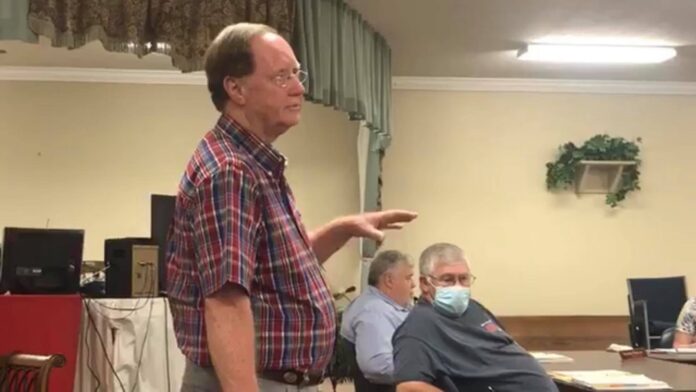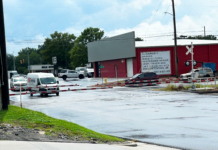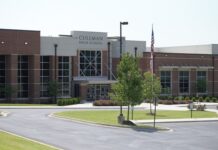
BAILEYTON, Ala. – Frustrated Baileyton residents and leaders had an opportunity Monday night to speak with Rep. Randall Shedd, R-Fairview and Sen. Garlan Gudger, R-Cullman regarding lack of internet in their area. Shedd and Gudger answered questions from their constituents and tried to reassure them that Cullman County’s legislative delegation is working together to secure grants through the Alabama Department of Economic and Community Affairs (ADECA) to help bring broadband to Baileyton and surrounding areas.
Mayor Johnny Dyar began saying, “When Ms. (Gov. Kay) Ivey was campaigning, she said that one of her top priorities was to have broadband and the internet throughout the state of Alabama. It was kind of amazing to me. I’ve got a grandson 12 years old, and they sent him home from school and told him to do his homework through the internet. Well, half of Alabama doesn’t have internet, so how in the world can these representatives send these kids home and ask them to do their homework on the internet when half the state doesn’t even have it?”
He continued, “The only way we will ever get the internet or broadband or anything in this part of town or Alabama, which is Baileyton, Fairview, Holly Pond, Hulaco and surrounding area, is by numbers. You won’t ever do it by two or three people hollering and screaming and carrying on. It just won’t work. The only way, and I promise you I know this to be a fact, I’ve been doing this for 16 years and I know exactly how it works, is by numbers. That’s the only way to get it done.”
Three petitions are currently being circulated around Baileyton and surrounding areas. The first is to the Federal Communications Commission (FCC) to change is definition of “broadband” internet from 25 megabits per second (Mbps) to 100 Mbps.
Residents Glenn and Debra Miller, who are circulating the petitions, have three school-age children and have been struggling with the internet service they do have.
“We are trying to get better internet service for those who do have it,” said Debra Miller. “We have AT&T, and we are paying for 18 megabits and we are only getting 16. The minimum for broadband is 25, and that’s by the FCC. We aren’t even at the minimum.”
She continued, “Even now, with the pandemic going on, and they want the kids to distance themselves for learning and all this, there can only be one kid on the internet at a time to do schoolwork. If you have two, your service will go out. Actually, it goes in and out anyway because AT&T won’t fix the problem.” (AT&T did not have a representative at the meeting to answer this claim.)
The second petition is to Ivey to give grants for internet service providers to move into the area or for the cooperatives to provide high-speed internet to the towns that were passed over for grants.
The third petition is to the Cullman Electric Cooperative to run fiber optic line to the rural areas so that they can provide high-speed internet or internet service providers can piggyback off the fiber so they can bring high-speed internet to rural towns.
“This is an election year, and if we start these petitions and start getting the politicians involved in this and start screaming about it, something is going to have to change. Especially if they want to get re-elected,” Debra Miller said.
Last year, Shedd sponsored House Bill 400, which, according to him, “authorizes electricity providers to use their existing and future power lines, rights-of-way and infrastructure to partner with companies to provide or expand broadband/telecommunications services or actually be in the business themselves.” The Broadband Using Electric Easements Accessibility Act was signed into law by Ivey in 2019.
Shedd said in a statement about ongoing efforts to bring broadband to rural areas:
“Sen, Clay Scofield, R-Guntersville and I have been working on access to rural broadband from the time I arrived in the Legislature. It’s been a battle to pass broadband legislation due to competing companies protecting their territories. But we passed major legislation last year and the year before. One provides grants to expand. The other gives broad authority to electricity providers.
“A broadband company has applied for grants to expand broadband in the Baileyton area. I’ve been in constant contact with the governor’s office and ADECA (the agency administering the grants) and I am hopeful they will be approved.
“Broadband legislation usually comes through the House committee that I chair (Urban & Rural Development). My committee has been proactive on the issue. I am a member of the Joint House/Senate Broadband Oversight Committee, which hopefully will be important with the CARES Act federal funding recently provided to the state for COVID-19 response.
“The recent shutdowns and work from home and school requirements validated what we’ve been saying about broadband- it’s not a luxury anymore; it’s a necessity. As we work to rebuild our economy, broadband and small cell (5G) will be crucial. I do expect some major broadband expansion announcements to be made soon that will help my legislative district.”
Local internet service provider Cyber Broadband has applied for a grant through ADECA to expand broadband service in the area. Owner Jay Fuller was also in attendance at Monday night’s meeting. Shedd informed Fuller that he had been assured by the governor’s office and by Kenneth Boswell, director of ADECA, that Fuller’s application is still ongoing and “in the hopper.”
Gudger joined the conversation and spoke about the COVID-19 response funds, saying, “The COVID-19 money that came into the state of Alabama, $1.8 billion, Jefferson County because their population will get $114 million of that, (leaving the rest of the state) with $1.7 billion. Having said that, the Legislature, before we left, we had about 10 buckets on the table and we put a lot of money in each bucket. Part of that is for school instruction and telecommunications. The only way that you are able to do some type of internet service is probably going to be in that bucket that has $300 million in it. That’s the federal money that I think would be doing something immediate that we aren’t coming back in three years from now going, ‘Hey, what about those grants?” The State is waiting on the federal government to provide clear requirements to make sure of reimbursements.
The Millers have distributed the three petitions at businesses throughout Baileyton and surrounding areas. Residents are also being encouraged to reach out to elected officials and voice their concerns. Contact information for Ivey, U.S. Rep. Robert Aderholt, R-Alabama and U.S. Rep. Mo Brooks, R-Alabama was also given out Monday night.
Gudger did deliver some good news to Baileyton residents at the meeting when he announced the State will be paving County 1564/delivered some great news for Baileyton Monday night. He announced that the state will be paving County Road 1564/Fire Station Road.
“I got word today that it will be one year by the end of this month that it will be fully paved through the state and not coming out of your pocket at all,” he said.
In other business
The Baileyton Town Council agreed to add a stipulation to the lease of the 17 acres of land acquired by the Town in 2018 that it can only be used for hay and that row crops are not allowed.
Copyright 2020 Humble Roots, LLC. All Rights Reserved.


























